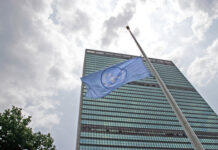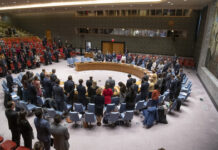This is the News in Brief from the United Nations.
Israel-Palestine crisis: Gaza City a ‘ghost town’, reports UN aid agency
Amid hopes of a deal to extend the pause in fighting in Gaza between Israel and Hamas on Wednesday, the UN agency for Palestinian refugees, UNRWA, reported that humanitarian assistance had reached its shelters in northern Gaza for first time since war erupted last month.
Thomas White, Director of UNRWA Affairs in Gaza, said that parts of Gaza City resembled a “ghost town”.
He added that the impact of heavy airstrikes and shelling was clearly visible and had complicated aid deliveries.
Wednesday marks the sixth and final day of a truce between Hamas and Israel that was facilitated by Qatar. Humanitarians have urged the warring sides to support repeated international calls to extend the pause in fighting, which has facilitated the reported release of at least 85 hostages by Hamas, and of more than 180 Palestinian prisoners by Israel.
Eating healthily costs 4.3 per cent more today than in 2020: FAO
Worrying news now from the UN Food and Agriculture Organization FAO which warned on Wednesday that eating healthily costs well over four per cent more than in 2020.
The finding is revealed in FAO’s annual Statistical Yearbook, which also highlights the impact of natural and man-made disasters on agriculture, too.
According to FAO, disasters correspond to average losses in farming of $123 billion per year, which is five per cent of annual global agricultural output.
And while more than 870 million people worked in agriculture in 2021, representing 27 per cent of the global workforce, this is well below the number at turn of the century, when one billion people worked in farming – the equivalent of 40 per cent of all those working.
Food loss data is also covered in the UN agency’s statistical yearbook, which finds that almost 20 per cent of food is lost in sub-Saharan Africa after harvesting. This is the highest tally globally; the lowest is in Northern America and Europe, at nine per cent.
WHO: Europe has highest number of children with type 1 diabetes
A warning now from the UN health agency that countries need to do much more to detect and prevent diabetes – particularly in Europe, which has the highest burden globally of type 1 diabetes sufferers among adults and children.
According to the World Health Organization, WHO, Europe has nearly 300,000 youngsters with type 1 diabetes.
The region also sees the highest number diagnosed with the illness every year, placing a huge burden on individuals, societies and healthcare systems, including reduced quality of life, productivity losses and high treatment costs, WHO said.
The UN agency noted that vision impairment linked to diabetes is the most preventable cause of blindness among Europe’s working-age population, as it convened a summit in Belgrade to accelerate action on commitments to improve diabetes detection and care.
Daniel Johnson, UN News.
Source of original article: United Nations (news.un.org). Photo credit: UN. The content of this article does not necessarily reflect the views or opinion of Global Diaspora News (www.globaldiasporanews.com).
To submit your press release: (https://www.globaldiasporanews.com/pr).
To advertise on Global Diaspora News: (www.globaldiasporanews.com/ads).
Sign up to Global Diaspora News newsletter (https://www.globaldiasporanews.com/newsletter/) to start receiving updates and opportunities directly in your email inbox for free.



























